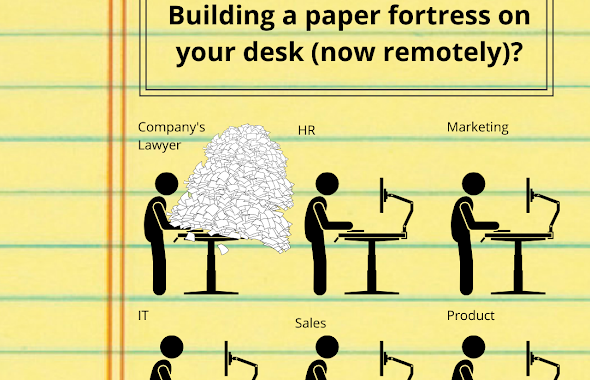In her job as managing director of innovation and knowledge at the law firm Paul Hastings, Nicola Shaver regularly has to search for technology tools to address needs or tasks within the firm. The problem, she found, is that there is no easy way to do that. As she talked to others around the world in roles similar to hers, she realized this was a global problem.
The realization spurred her to act. Last month, Shaver and her husband, Chris Ford, who is chief marketing officer at the legal technology company ZERØ, unveiled Legaltech Hub, a website that aims to be the most complete global directory of commercial legal tech worldwide. “Our mission is to democratize legal technology,” she told me recently.
As a side project to their day jobs, Shaver and Ford spent six months building the site, scouring every resource they could find to come up with what they believe is the most comprehensive directory anywhere of legal technology. As of today, it lists 1,638 tools.
This was a notable achievement and a much-needed resources. I can attest to that personally, as I’ve endeavored to maintain my own list of legal technology startups, and understand full well the challenge of keeping up with a rapidly accelerating industry.
But good things come in threes, they say, and on the heels of the launch of Legaltech Hub have come two additional sites created to help legal professionals sift through the clutter of competing legaltech products.
Two weeks ago, the law firm Orrick Herrington & Sutcliffe announced the launch of The Observatory, a directory of more than 600 legal technology products. Orrick initially developed the directory as an internal resource, but decided to make it public after seeing how its corporate clients struggled to make technology decisions.
The Observatory is intended to allow the potential law firm and legal department buyers of these products to perform a preliminary comparison and analysis, showing which products are available for a given function and what makes each unique in the market.
Then, last week, Thomson Reuters announced the beta launch of its Thomson Reuters Marketplace, an online store where users can research, demo, test and buy products and services. Slated for global availability in February, TR’s Marketplace is an open environment where users can test some 50 products.
So far, many of the products are add-ons or integrations — including from third-party vendors — for two of TR’s own products, its HighQ legal operations and workflow product and its Elite 3E business management product. But TR says it will continue to expand Marketplace, adding products for legal, tax, and accounting professionals as well as for government and regulatory customers.
Among the planned additions are a suite of legal products from global legal services provider KPMG Law. These will include applications that KPMG has built on the HighQ platform; services to help clients properly configure HighQ when accessing Marketplace’s solution templates; and access to services provided by KPMG’s Legal Operations and Transformation Services team, including change management, process optimization, and operating model assessment.
All three of these marketplace debuts follow the formal launch last January of Reynen Court, the platform that has been dubbed the app store of law — and in which the aforementioned Orrick is a principal investor, along with global firms Clifford Chance and Latham & Watkins — and come as Reynen on October 28 announced an additional $4.5 million in funding (and said just today that Japan’s largest firm has invested in the company).
Reynen Court’s mission is to make it easier for law firms and legal departments to adopt and manage modern cloud-based software applications without having to trust firm or client content to the rapidly growing universe of vertically integrated SaaS providers.
Its platform combines a “solution store” for legal technology with a control panel that makes it easier for law firms and legal departments to run cloud-based applications, either on-premise or within virtual private clouds. This enables firms to access cloud-based products while minimizing concerns over security and stability.
Notably, Reynen Court recently launched a new functionality called Test Drive, which founder and CEO Andrew Klein recently demonstrated for me. It allows users, with just a click of a button, to run preconfigured versions of applications and test them out without the formalities of setting up pilots and before committing to licensing them.
The legal technology market these days is characterized by an embarrassment of riches. For legal consumers, that is a double-edged sword. While there are more products and capabilities than ever before to choose from, making sense of them all can be daunting and confusing.
So, yes, good things come in threes. And, here, three is nowhere near a crowd (or four, factoring in Reynen Court). Legal consumers need services such as these to help them sift through the static and make informed purchasing decisions.
While I have grouped these marketplaces together in this article, they are different in what they offer. Where Legaltech Hub and Orrick Observatory aim to be comprehensive catalogs, the TR Marketplace and Reynen Court focus on making it easier to test products in advance and then more seamlessly deploy them.
Note also that all of these directories are targeted at consumers at larger law firms and corporate legal departments. For smaller firms, no comprehensive directory exists, but a good resource is the American Bar Association’s Legal Technology Buyers Guide. Above the Law’s site Evolved the Law also has a directory but nowhere near comprehensive.
But all of these sites help fill a need by organizing and providing access to information about the rapidly expanding universe of legal tech products. As Shaver realized through her own work, that is a global need.
(By the way, if you’d like to learn more, listen to my LawNext podcast episodes with Nicola Shaver, recorded just after ILTA named here Innovative Leader of the Year, and Reynen Court founder Andrew Klein.)
Robert Ambrogi is a Massachusetts lawyer and journalist who has been covering legal technology and the web for more than 20 years, primarily through his blog LawSites.com. Former editor-in-chief of several legal newspapers, he is a fellow of the College of Law Practice Management and an inaugural Fastcase 50 honoree. He can be reached by email at ambrogi@gmail.com, and you can follow him on Twitter (@BobAmbrogi).
 Kathryn Rubino is a Senior Editor at Above the Law, and host of The Jabot podcast. AtL tipsters are the best, so please connect with her. Feel free to email her with any tips, questions, or comments and follow her on Twitter (@Kathryn1).
Kathryn Rubino is a Senior Editor at Above the Law, and host of The Jabot podcast. AtL tipsters are the best, so please connect with her. Feel free to email her with any tips, questions, or comments and follow her on Twitter (@Kathryn1).








 Jordan Rothman is a partner of
Jordan Rothman is a partner of 


 Olga V. Mack is the CEO of
Olga V. Mack is the CEO of 


